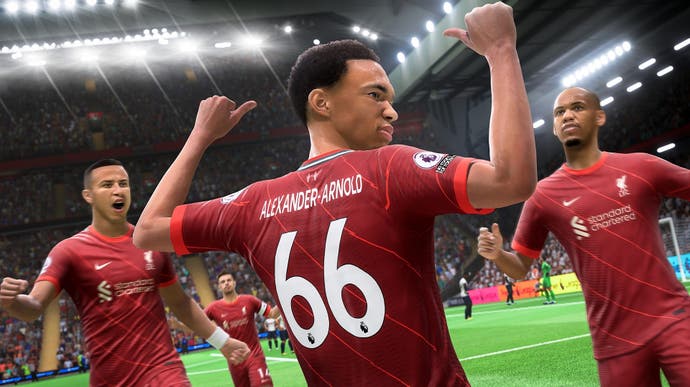The big interview: EA, FIFA and loot boxes
"Kids should not be spending in our game."
FIFA 22 is out in the wild, and in gameplay terms it's going down well. But, as anyone who's read Eurogamer's review will know, we still have a few problems with how it's monetised. Specifically, the hugely-popular Ultimate Team mode and its controversial loot boxes.
Ultimate Team, which drives hundreds of millions of dollars in revenue for publisher and developer EA each year, revolves around the idea of building a squad of players, which you then use to play in matches, both offline and online.
There are a number of ways you can obtain players in the game, but one of the main methods is through packs of virtual cards. These card packs contain a random assortment of items, including players of varying potency you then use out on the pitch. Generally, the better the player, the lower your chance of obtaining them from a pack. Although they're not described as such in-game, Ultimate Team's card packs are loot boxes.
You can buy these card packs with either a virtual currency called FUT Coins, which is earned primarily through gameplay, or with a virtual currency called FIFA Coins, which is bought with real-world money.
It's this real-world money aspect of Ultimate Team's loot boxes - and the fact the loot boxes contain gameplay-affecting items - that has caused so much controversy for the mode and EA over the years.
But EA's loot box controversy is not the exclusive preserve of FIFA. It was loot boxes that caused EA to hit the mainstream headlines back in 2017 with Star Wars Battlefront 2, a game that was mauled online for a system players said took advantage of them. Facing a vociferous backlash, EA changed Battlefront 2's loot box system, with executive Patrick Söderlund admitting at the time the company had "got it wrong". Söderlund also promised future EA games would learn from the company's mistakes.
And yet, loot boxes with gameplay-affecting items persist in Ultimate Team, leading some to consider it a pay-to-win experience. That's not just the view of many players of the game - many who play FIFA professionally reckon Ultimate Team is pay-to-win, too.
But that's just half the story. Governments from across the globe have over the last few years taken a close look at video game loot boxes and whether they should be considered gambling. Some countries have decided they are, forcing EA to change the way Ultimate Team works locally. Other countries have not.
In the UK, video game loot boxes are not currently classed as gambling, but the government is investigating to see if the law should be applied to them. In December 2019, the Department for Digital, Culture, Media and Sport launched a review of loot boxes alongside a wider review of the Gambling Act 2005, and in June 2020 announced a public call for evidence. The government commissioned Abertay University to assess this evidence, and the hope is a report will be issued by the end of this year. If so, the government may act at some point in 2022.
While EA maintains Ultimate Team's loot boxes do not constitute gambling, in a recent regulatory financial document the company acknowledged a change in the law could significantly impact its business.
All this comes amid concern over the impact of loot boxes on children. We've all seen the headlines of parents who were surprised to find their child had spent loads of money on Ultimate Team. We've seen some children come forward to say they felt they were addicted to spending in Ultimate Team. It's a passionate debate that is not going anywhere, despite the various initiatives and playtime checks EA has implemented in recent years.
It was with all this in mind that I sat down with EA Chief Experience Officer Chris Bruzzo to discuss the thorny issue of FIFA and loot boxes. The below Q&A presents our entire half-hour conversation, edited slightly for clarity. In it, we discuss EA's position on loot boxes as pay-to-win, its position on loot boxes as gambling, and EA's plan for any potential UK clampdown.
Well, Chris, first off, thanks so much for your time, I really do appreciate it. It's really great to speak to someone at EA about this. I'm a big FIFA fan. I play the game every year. And I actually think the game plays really well this year - gameplay wise, it's probably the best it's been a long time.
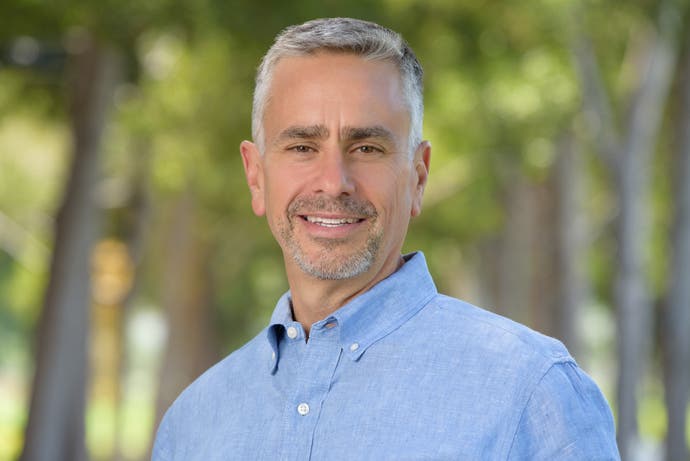
Chris Bruzzo: Thank you. I'm glad to hear that. I will share that back. Although of course we've all read your review. I think you've done an excellent job of actually breaking apart the different dimensions of the game and which parts are improved, and which parts are improving. So thank you for that.
Thanks for the kind words! I always end up reviewing the game for Eurogamer every year. It seems to be my thing! What I hope the review gets across is that I feel the monetisation side of Ultimate Team is problematic at the same time as the game playing very well. I enjoy playing the game, and so much about it, but it's this part of it that I feel has some issues. And that's really what I'd love to dig into a little bit of detail with you.
The confusion I have is, why EA seems to have one rule for some of its games, for example, Battlefront - but not just Battlefront, pretty much all the non-EA Sports titles - and another rule for FIFA, for the EA Sports titles, which do have loot boxes with gameplay-affecting items in them? I'm going to speak honestly and frankly with you during this interview: it seems hypocritical, I think, that EA would on the one hand say all these things about their strategy for one game or games, and then do a completely different thing for FIFA. How do you justify that disconnect?
Chris Bruzzo: I'm going to say some things that you know, Wes, but just for the benefit of setting some context: the games are different. If we only had EA Sports games, we might have a more similar set of gameplay than we do. But we make lots of different kinds of games. I've been at EA seven years, and so I've been involved in every one of the games that we're talking about here in the last seven years, including Battlefront and Battlefront 2. Entirely different game with a different set of decisions and different circumstances.
So the first thing we have to recognise is that we make these games to be each individually, incredibly fun, as fun as they can be and engaging as they can be, and that means they're different. They're all different from each other. And FIFA you know, because you play it a lot, just like I do, FIFA has so many different things going on in it. There's so many different modes, but even within Ultimate Team there's a tonne going on inside that mode.
And so the key thing is, we have to recognise something like 100 million people played FIFA in some form or another last year. FIFA 21, the PC and console game, 30 million people played FIFA 21. It seems obvious, but that's a lot of people with very different motivations for playing and expectations for the game. And we have to do our best to serve as many of them as we can. And the truth is, Ultimate Team is the most popular mode in FIFA. So when you think about a mode that's got tens of millions of players playing it pretty much all the time, first of all, we have a huge fan base of players who love the mode the way it's set up today, and they love every aspect of it.
But also, we engage directly with players and there is at this point intense debate about every single change we make. Like goalkeeping - in which year has goalkeeping not been an issue for some segment of the playerbase? So we love the fact that so many players are so engaged.
Your article so far has generated over 220 comments. I read every single one of 'em. And by the way, some of them keep me up at night. And I'll tell you why. I come to work every day with thousands of people that I've gotten to know over the last seven years, including some very, very dedicated people with families whose life's passion is to make this game, FIFA. And they are good people, and they're actually very good at what they do. And they make a game and a mode that is incredibly popular and successful. And to be honest, it is tough to sometimes feel like the work that those dedicated people are putting in is so easily dismissed. And with a lot of vitriol.
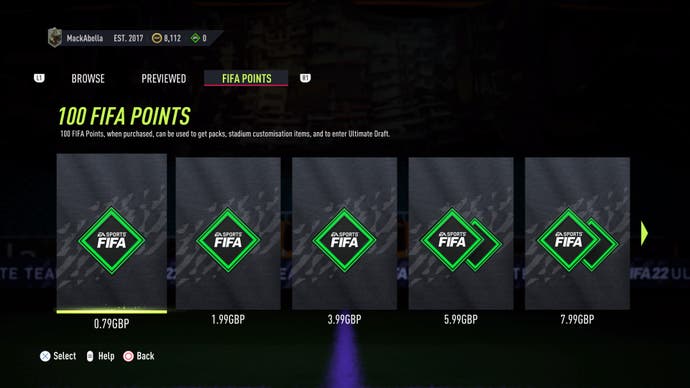
I get that, but I should point out that, in all of this, there is no ill-will directed at the designers of the gameplay, the people we see when they do the preview presentations, the people who are designing gameplay changes and the way the modes function in a changing from year to year way. I don't think the problem here is to do with any any of that stuff, or the people who make that. I've said in articles, this isn't about the designers, the developers - I'm sure it must be tough for them to have this part of the game so heavily scrutinised and the vitriol, as you say. It's about the monetisation. It's about loot boxes and the way they work, and all the other things that come from it.
So I don't think this has ever been about those people. It might be about the people who are making the decisions at EA to have loot boxes and monetise in the way they are. I'm sorry, but yeah, it might be directed at those people. But it's not directed at developers making gameplay improvements, graphics improvements, changing the way the modes work.
Chris Bruzzo: That's a difference without a distinction, actually. The people who make FIFA at Electronic Arts come from a wide variety of professional backgrounds, and they all engage directly in really important, challenging decisions all the time. So really, whether that's marketers who help get people excited about the game, that's a function of the company I've been responsible for for many years, for my whole seven years. Whether that's our commercial team, who needs to make sure that the game is a success in every market, in every channel around the world - that's also been part of my responsibility in the past. Whether it's our customer experience people who take phone calls from our players, and answer emails at the rate of tens of thousands. These are all real people. And so am I. I'm a real person sitting here in California. And to be honest, there's not a real distinction here. It's not like we have groups of people who are sort of just doing their thing, separate from everyone else. To put a game together and bring it to market is an incredibly integrated thing.
So I hear you, that it may be convenient to separate the developers from everyone else. It's actually not real.
That's fair enough. If that's the way we have to think about it, fair enough. I don't think that means we can't scrutinise this part of the game, that we can't ask tough questions about it. If everyone's in the same boat at EA making the game and they feel that collectivity, that's fair enough.
Chris Bruzzo: So, why do we do what we do then? Why do we put the game together the way we do? Let's ask the tough questions.
Well, why do you have loot boxes in FIFA in the first place, then?
Chris Bruzzo: So when we put this game together, and I'm going to say we, I'm going to speak on behalf of the large group of many thousands of people who helped to bring this game to market every year, the idea is we are doing our best to reflect the real world of football. When I go to events all over the world, I can grab a mic, and I can pull it up to my mouth and say, 'EA Sports.' And everybody says, 'It's in the game.' That has been going on for decades. It's at the core of every EA Sports game. And so, yeah, we want to strengthen the connection between the real world sport and the game, the FIFA game that you play. Progress, engagement, this builds, just like it does in a real world season.
My Toffees are without Dominic Calvert-Lewin, without Richarlison, without Séamus Coleman, and who did we put on the field this weekend? Rondón and Andros Townsend and Demarai Gray. And guess what? We were able to draw United at United. So this is what we attempt to do when we make the game. If it's in the game, it's in the game.
So in fact, that whole gamification of what it means to have a different roster of players coming from different backgrounds, with scarcity, with not the ability to just you know, grab Lionel and put him on PSG. In fact, we have created these things over a long period of time to actually mirror what it feels like, the tough strategic choices you have to make when you're putting a squad together that works uniquely as that squad you want to manage, that you want to play with. That's why it all fits together the way it does. And let's not forget there's a transfer market.
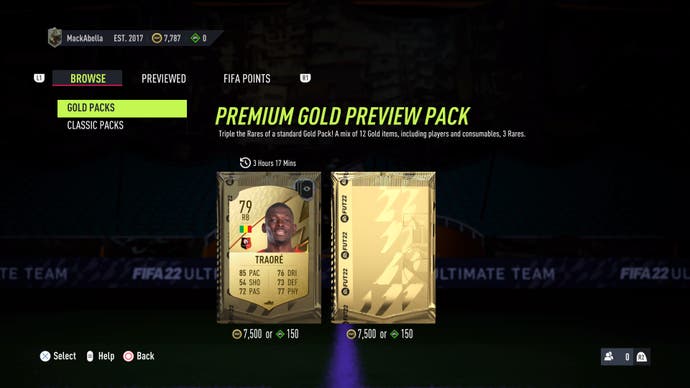
The problem with it, and the point with the loot boxes, is you're buying gameplay-affecting items. Your loot box contains players you use to play in a competitive multiplayer mode - or you can do that, right?
Chris Bruzzo: Just like real world football.
In real world football you don't buy a loot box and you get what players you get. You go out and buy a player directly, if you can afford it. That's completely different to FIFA. What you're doing in FIFA is allowing people to spend real-world money on the chance of getting players. Now I know that you've got pack probabilities in there, but you don't know who you're gonna get. That's not real football.
Chris Bruzzo: Let me be very very clear about this point: nine out of 10 FUT packs that are opened in FIFA are opened with coins. Coins are earned by playing the game. That's not real-world money.
I know, but you can.
Chris Bruzzo: It's so interesting how we just gloss over the fact that nine out of 10 FUT packs are opened with coins.
Nobody's disputing that you can earn this stuff through gameplay. I've never done that. I'm not going to get into the nitty gritty of the grind, and whether the grind is worse this year than it has been before. I don't think that is worth getting into here. I take your point. I fully accept most people don't spent money on FIFA. But the point is you can. You can pay to win in FIFA. How can you deny that?
Chris Bruzzo: Well, what you just said a minute ago was that in real-world football, you can use resources to assemble the best possible squad. And in our video game, you can use either FUT Coins or FIFA Points. And nine out of 10 packs are opened with FUT Coins, which are earned by players who are playing the game.
And the other really important thing is that 78 percent of all FIFA 21 players never spend anything in the game, Wes.
I completely accept that. That's not the point. The point is that you can. You can pay your way, and many people do.
Chris Bruzzo: And that's called choice. That's called player choice. Players have a choice.
To pay to win?
Chris Bruzzo: I'm going to come back to tens of millions of players playing FIFA Ultimate Team. 30 million people played it last year, and 100 million in some form or another - mobile games and all over the world. And so yes, we provide players with lots of choices. You can play seasons. You can play pro clubs. You can play FIFA Ultimate Team. You can open your packs with FUT Coins. You can trade players on the transfer market. And yes, you can buy FIFA Points and you can use them to open packs.
But you know what? We've heard this concern. We've heard it from you every single year. So what are we doing about it? You already mentioned some things - we've put probabilities in our packs. That's about transparency of information. We launched FIFA Playtime, which you know because you wrote about it. That's also about sharing information with players. We actually want to treat them like full human beings who can make good decisions in their lives. And we give them choice.
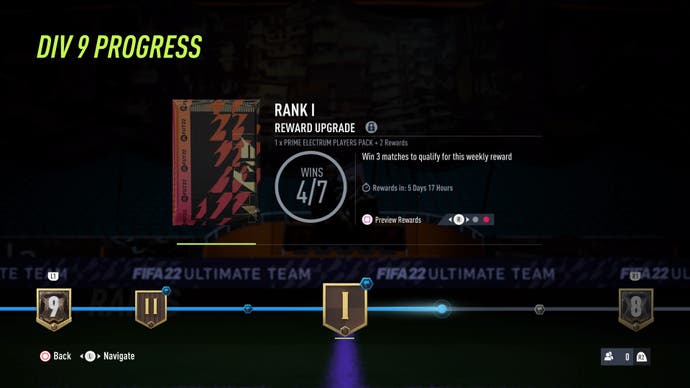
Okay. There's so much to talk about, and we have limited time, so I'll move on...
Chris Bruzzo: I will say one more thing Wes: I promise you, I play a tonne of FIFA, but I can tell just from reading your article, that if I had the very best squad in FIFA Ultimate Team, I would lose to you every single time. It's about skill.
Okay, I'll make a related point just to close out the pay-to-win discussion we're having. If I go online in a competitive game of FIFA Ultimate Team, as many millions of people do, and I see the squad of my opponent, I do not know if that person has obtained that squad by spending money on loot boxes, or has obtained that squad through gameplay. So I could lose to that team, who is being played by someone who has a similar skill to me, who has an advantage because they have better players - faster, more powerful, better players. I don't know if they have thrown a thousand pounds since the game has come out at FIFA and obtained those players through loot boxes. I have no way of knowing. That is an inherently pay-to-win experience. I don't know how you can deny that.
Chris Bruzzo: Except that now you know that nine out of 10 FUT packs are bought with FUT Coins.
Yeah, but my opponent might have been the 10. They might have been in the percentage who spent. How do I know? How do I know I was playing on a level playing field against that person?
Chris Bruzzo: The reality, Wes - and we study this constantly - FIFA Ultimate Team is by far and away a game of skill. And the player's skill is by far the fundamental contributor to that player's success rate.
Okay. Let's move on to the issue of the link between loot boxes and gambling. There's been lots of studies and research done into this over the years, but I'm going to keep it recent, so stuff that's fresh in the mind. Earlier this year in April, research done by UK universities came out that said there was a link between loot boxes and gambling, that they had "robustly verified" this link. Are they wrong?
Chris Bruzzo: We also have lots of regulators who have come out to say that loot boxes are not gambling. And researchers, too. There actually isn't consensus at this point on this topic. In Australia, in France, in Sweden, in Denmark, all the regulators have all said, no, we're not going to regulate this under gambling laws.
Now, in the UK, we're actively working with the government. We're at the table with our industry partners and with the government. And we're ready to hear what those issues are. And we're ready to engage on real solutions, because we're real people.
I'll just speak for myself: when I hear about an individual who has spent too much time or too much money in FIFA, it pains me. It drives us, actually. We don't want that. We're not building the game for that. So it drives me to want to encourage things like the FIFA Playtime dashboards, to encourage parental controls, to spend real dollars with organisations like Internet Matters, to massively increase awareness around how many controls parents have around spending, not just in our game, but in all games. So we're ready. We will work on real solutions. But we need to get to some kind of consensus.
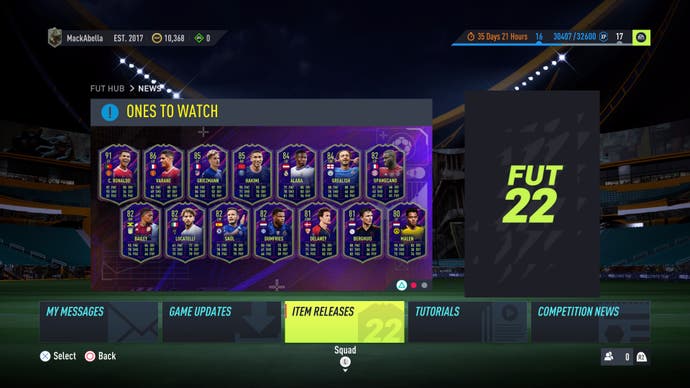
You talk about consensus - in the UK, obviously my focus, it's not just this particular research that has said this. The House of Lords' Gambling Committee has said that video game loot boxes should be regulated under gambling laws. And, crucially, that report says young people are most at risk of becoming problem gamblers. The Children's Commissioner in the UK has said the same.
So you've got multiple organisations in the UK all saying pretty much the same thing here, backed up by thorough research by two respected universities. Now even if you take issue with the question of whether loot boxes should be considered gambling - you are obviously doing that - if there's a chance that they're right, that they could affect children in this way, that children are most at risk of becoming problem gamblers as a result of loot box design in FIFA - a 3+ game for everyone - even if there's a small risk, don't you think it would be the right thing to do to change the way the game works?
Chris Bruzzo: Kids should not be spending in our game. Children should not be spending in FIFA.
But they do.
Chris Bruzzo: Actually, when we look at account signups Wes, we see very low percentage of accounts of people under the age of 18. But more importantly, our default is set to no spending for accounts under 18. And we work with Sony and we work with Microsoft to also institute spending controls as a default for children. Kids should not be spending in FIFA full stop.
You say kids should not be spending in FIFA. Then why did you advertise FIFA Points in a children's magazine?
Chris Bruzzo: Let me say again, we're human. That was my team. That was my team that did that. It was an oversight. It was literally somebody checking boxes of places to put FIFA ads, and then a process by which we normally review where those ads are going to go, and we missed that step. And so this was a day when ads like that were going out into hundreds of channels, and somebody thought that that would be a good box to check. And so they included FIFA Ultimate Team in this toy catalogue. And we have apologised. We said it was a mistake. We do make mistakes, Wes.
I know. You're making the point children shouldn't be doing this and you have checks in place to help stop this from happening, but it does happen. And even if you were to eliminate children from the equation, you would still have these organisations saying loot boxes should be classed as gambling. Here's a direct quote from the House of Lords Gambling Committee's report on loot boxes: "If a product looks like gambling and feels like gambling, it should be regulated as gambling."
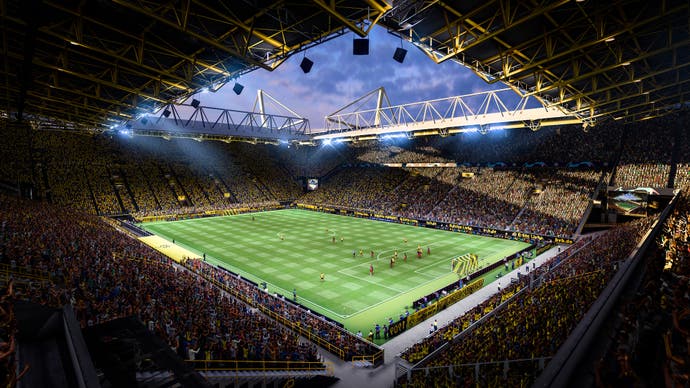
Chris Bruzzo: But what about the fact that actually you don't have a way of cashing out? Isn't that fundamentally what gambling is?
I've heard EA say this before as well. You can cash out. I can do a quick Google search now and sell my FUT Coins. FUT Coins is one of the items you can get in your loot boxes. I can sell them for real-world money. And it's easy.
Chris Bruzzo: Clearly, we know all about that, because we've had to put tonnes and tonnes of resources to combat it. It's an incredible responsibility to ensure the security of our game, so that we make it very difficult to commit fraud. But that's what that is. And just to be clear, again, we study this. I have the benefit of seeing data. The sellers on the black market, the ones that are actually making money, those are criminals. So I'm not sure where we're going with this argument.
Okay. You say you can't cash out. But if you look at the research published earlier this year commissioned by the GambleAware charity, that report, and I quote here again: "Many gamers do ascribe discrete financial values to loot box contents - based on purchase or resale price - suggesting that many loot boxes meet existing criteria for gambling regulation." So even if you couldn't cash out in a black market, or accept that isn't an issue, the fact gamers ascribe discrete financial value to what's in loot boxes has the same effect. People really covet this stuff.
Chris Bruzzo: Yeah. The reason I'm showing up here having this conversation with you Wes, is because there are a lot of players who enjoy playing this game. In fact, there's a whole set of players that never even put their squad on the pitch. They're just constantly building the best possible squads. I know a group of players that should have PhDs in economics for the kind of work they do in the transfer market in Ultimate Team, and they love it. If you look around behind me, I'm a football fan. My father's from Argentina. But the best player to ever play the game was Pelé.
I can't believe you're saying that as an Argentinian!
Chris Bruzzo: I have to! I have no choice. So there's a jersey from Pelé. And yes, it has value to me. You know why? Because it's one of the things I love to do in life. I love to do it. So I'm not sure I understand exactly. Electronic Arts exists to inspire the world to play. And yeah, that inspiration around play generates a lot of engagement and excitement. And a sense of, I built that squad, I collected those players, I worked hard to actually get them to a place where my OVR is 90 plus.
I hear you, I hear you. I do think we need to talk about the extremes. I do think we need to work on real solutions for those players who find themselves in the extreme situation where they've lost control of their time where they're spending. I agree. And again, we are taking action. We're not just talking. We're taking action. We're putting more information in front of players. We're driving awareness around parental controls. And we put in preview packs as you know. We are ready to continue to engage in solutions. We really are. I mean, I'm putting my hands together to make it clear to you. We care a lot about this. But we also have tens of millions of people who love collecting and playing and building the skill that they build in this game.
On that, would you ever consider taking out the ability to spend real-world money on FIFA Ultimate Team's loot boxes?
Chris Bruzzo: I'm going to go back to nine out of 10 people spend on FUT packs. Eight out of 10 people don't spend in FIFA at all. The ability to spend real-world money in the game represents choice for players. I'm 52 years old as of about a month ago. At 52 I don't have as much time as I did before. When I was 22, I could play and build the kind of team that I wanted to build. Today, for me, the choice that I made, is to play the game, earn FUT coins and spend a little bit on FIFA Points to help top off my squad. And I feel like that's a choice I should be allowed to make.
I think you're downplaying the spending real-world money aspect of Ultimate Team. You're making the point that the minority spend. But we know from EA's own financial reports that Ultimate Team as a mode makes an incredible amount of money, way beyond the dollar sales of the game itself. Yes, the minority spend, but it's obviously EA's mega money spinner. And in financial documents, EA has said a change in government legislation may significantly impact the business. EA is clearly aware of the importance of spending in Ultimate Team.
What will you, EA, do if the UK government returns its report by the end of this year, as it's expected to do, and says flat out that loot boxes should be considered and classed as gambling? What will you do then?
Chris Bruzzo: Most importantly, we will work with government, as I said consistently in this conversation. And this has been a great conversation. I enjoy the dialogue Wes, I really do. I like the back and forth. This will not be the last time we get to talk! Most importantly, we will work with government. We are ready. We're already at the table. We continue to bring actions all the time. We'll bring more. We're ready.
Second, you know as well as I do, video games have evolved a lot in the last 10 years especially. And one of the most important evolutions is that games can be played over a much longer period of time. And in fact, developers, they don't get to launch a game and then go to Hawaii or take a vacation for 30 days the way it used to be. Because you could launch a game, and then you had however much time until you had to make the game again. Now you launch the game and then you start. You continue to develop that game. That means all those wonderful people who care very much about football, who make our FIFA game, they have to keep on working and they love it. And that takes resources. It just does.
So if we're delivering great value, and apparently we are because 100 million people are playing the game, and when you get to that many people playing the game across every form in which you can play it, yes, that's a pretty big scale, and it can generate significant revenues. And we need those revenues in order to continue to pay our developers so they can continue to make more value and make the game more fun over time. I don't see that changing. I think players are clearly responding to the fun that they're having with ongoing content being distributed in the game. I think we're gonna continue to do that.
Thanks to Chris Bruzzo at EA for making himself available for this interview.
